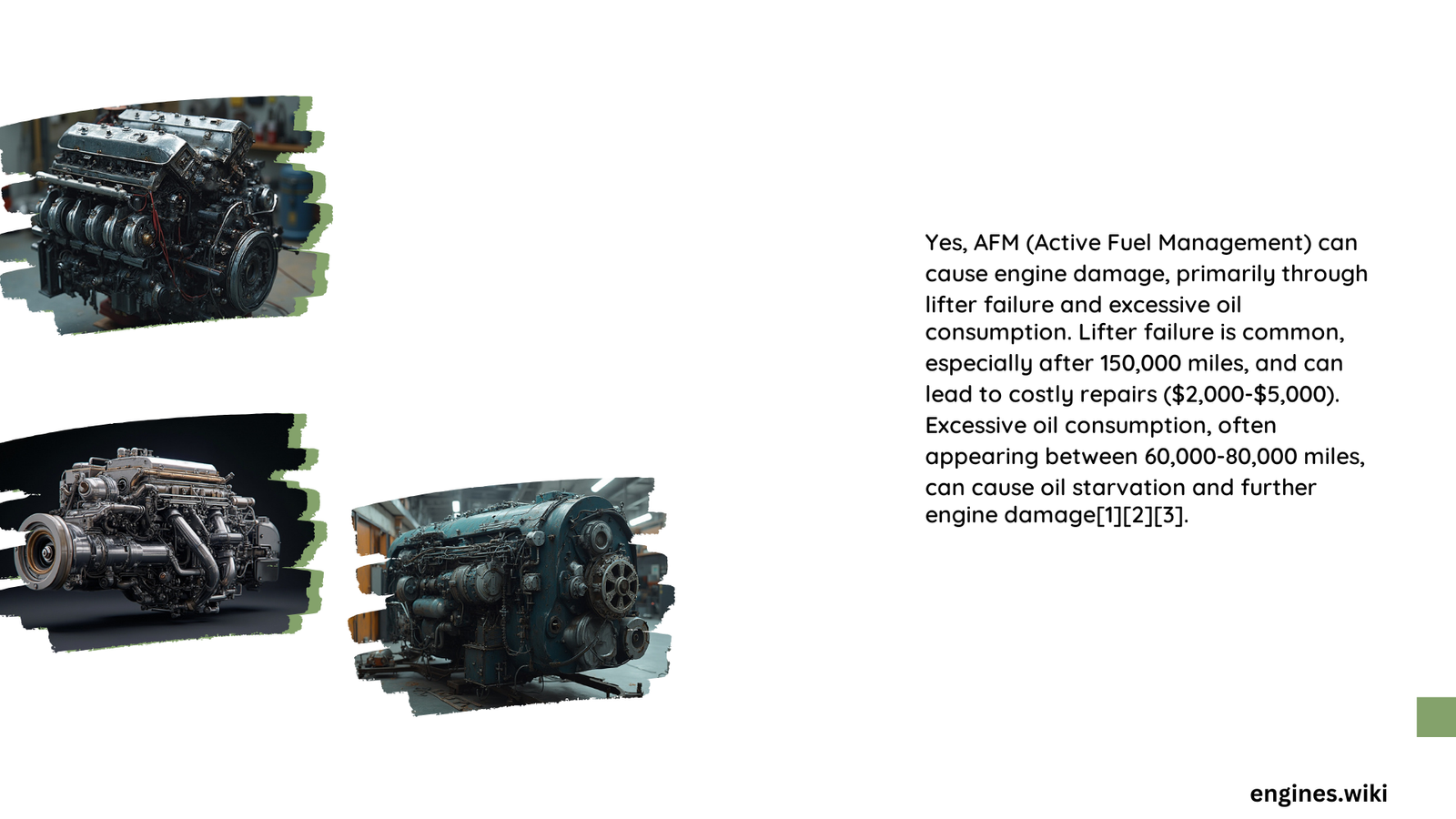Active Fuel Management (AFM) is a technology designed to improve fuel efficiency in vehicles by deactivating cylinders when full engine power is not needed. However, concerns have been raised about its potential to cause engine damage. This article explores the relationship between AFM and engine wear, common issues reported by vehicle owners, and the impact on engine components.
What is the Connection Between AFM and Engine Wear?
Active Fuel Management (AFM) has been linked to several engine damage issues, particularly in GM vehicles equipped with the 5.3-liter V8 engine. The primary concerns revolve around:
- Valve lifter failure
- Increased oil consumption
- Potential engine failure
Valve Lifter Failure
One of the most common problems associated with AFM is the failure of valve lifters. When AFM is activated, it shuts off fuel injection to 4 of the 8 cylinders, leading to a lack of combustion pressure in those cylinders. This can cause:
- Improper sealing of piston rings against cylinder walls
- Oil passing into the combustion chamber
- Increased oil consumption
- Eventual lifter failure
Engine Failure
In severe cases, AFM-related issues have led to complete engine failure. For example:
- A 2007 Chevrolet Suburban experienced repeated lifter failures
- The engine ultimately failed at 72,000 miles
What are the Common AFM Engine Problems?

Vehicle owners have reported several recurring issues with AFM systems:
- Valve Lifter Failure
- Excessive Oil Consumption
- Main and Rod Bearing Failures
Valve Lifter Failure
This is one of the most prevalent problems associated with AFM. The constant shifting between active and inactive states can cause lifters to collapse or fail, leading to costly repairs.
| Mileage | Failure Rate |
|---|---|
| 30,000 | Some engines |
| 300,000+ | Other engines |
Oil Consumption
AFM can lead to increased oil consumption due to the lack of combustion pressure in non-firing cylinders. This issue can:
- Start as early as 25,000 miles
- Increase over time
- Result in consumption of up to 3 quarts of oil between oil changes
Other Engine Issues
There are also reports of main and rod bearing failures, particularly in newer engines with the Dynamic Fuel Management (DFM) system, which is a successor to AFM.
How Does AFM Affect Oil Consumption?
AFM has been shown to significantly impact oil consumption in affected vehicles:
- Increased Consumption Rates: Some vehicles, like the 2007 Chevrolet Suburban, have been reported to consume 3 quarts of oil between oil changes.
- Early Onset: Oil consumption issues can start as early as 25,000 miles and worsen over time.
- Impact on Lubrication: The lack of combustion pressure in non-firing cylinders can lead to poor engine lubrication.
Effects on Oil Properties
- Degraded viscosity over time
- Reduced overall lubrication properties
- Exacerbated engine wear
What Causes AFM Lifter Failure?
AFM lifter failure is a common issue that can lead to significant engine problems. Understanding the causes and implications is crucial for vehicle owners.
Factors Contributing to Lifter Failure
- Constant switching between active and inactive states
- Potential for lifters to collapse or fail
- Reduced lubrication when AFM is deactivated for extended periods
Repair Costs and Diagnosis
Repairing lifter failures can be expensive:
- Diagnosing the issue may require removing the cylinder head (approx. $1,800)
- Replacing all lifters while the engine is apart can add another $1,800
Can AFM Be Safely Disabled?
Given the potential issues associated with AFM, some vehicle owners consider disabling the system. However, this decision comes with its own set of considerations:
- Warranty Implications: Disabling AFM may void the vehicle’s warranty.
- Fuel Efficiency: Turning off AFM will likely reduce fuel efficiency.
- Performance: Some owners report improved performance after disabling AFM.
Methods to Disable AFM
There are several ways to disable AFM:
- Aftermarket Devices: Products like the Range AFM Disabler can turn off AFM.
- ECU Tuning: A professional can reprogram the engine control unit to disable AFM.
- Mechanical Modifications: In some cases, mechanical changes can be made to prevent AFM activation.
What Are the Long-Term Effects of AFM on Engine Life?
The long-term impact of AFM on engine life is a subject of ongoing debate:
- Increased Wear: Some argue that the constant switching between active and inactive cylinders accelerates wear.
- Reduced Engine Longevity: There are concerns that AFM-related issues could shorten overall engine life.
- Maintenance Costs: Higher oil consumption and potential lifter failures may increase long-term maintenance costs.
Factors Influencing Long-Term Effects
- Driving Habits: How the vehicle is driven can impact AFM activation frequency.
- Maintenance: Regular oil changes and using the recommended oil type may mitigate some issues.
- Vehicle Model and Year: Some model years seem more prone to AFM-related problems than others.
How Can Vehicle Owners Mitigate AFM-Related Issues?
While AFM-related problems can be concerning, there are steps vehicle owners can take to potentially reduce the risk of damage:
- Regular Maintenance: Follow the manufacturer’s recommended maintenance schedule.
- Use High-Quality Oil: Choose oil that meets or exceeds the manufacturer’s specifications.
- Monitor Oil Consumption: Keep track of oil levels and consumption between changes.
- Consider AFM Disablement: Weigh the pros and cons of disabling AFM for your specific situation.
- Stay Informed: Keep up with technical service bulletins and recalls related to your vehicle model.
By understanding the potential risks associated with AFM and taking proactive measures, vehicle owners can make informed decisions about their engine’s health and longevity.
